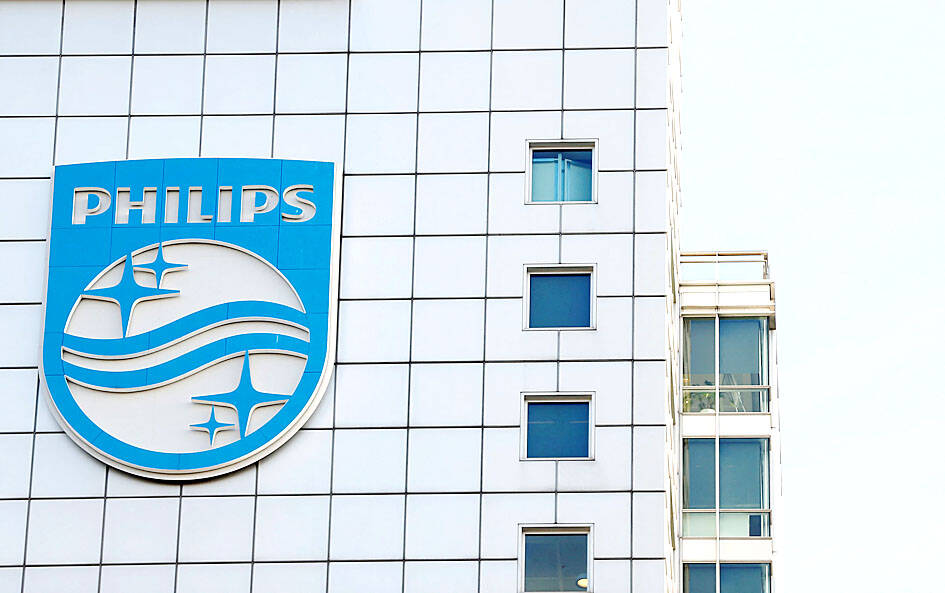Dutch medical device manufacturer Royal Philips NV yesterday said that it would cut 4,000 jobs as another massive penalty for faulty sleep respirators pushed it into loss.
The 1.3 billion euro (US$1.28 billion) charge for the defective machines pushed the firm into a net loss of the same amount, the company said in a statement.
Philips has been bedeviled by faulty devices that put users with sleep apnea at risk of inhaling toxic foam. The firm’s previous CEO stepped down earlier this year after leading the company’s transition from a consumer electronics to medical device manufacturer over the past 12 years.

Photo: Reuters
Philips had already set aside 900 million euros over the faulty respirators and had warned two weeks ago that it would take the 1.3 billion euro charge this quarter.
New chief executive Roy Jakobs said that his “immediate priority is ... to improve execution so that we can start rebuilding the trust of patients, consumers and customers, as well as shareholders and our other stakeholders.”
Jakobs said Philips would double down on patient safety and quality management, improve supply chain operations so that it can better fulfill orders and carry out a restructuring of operations to improve productivity.
“This includes the difficult but necessary decision to immediately reduce our workforce by around 4,000 roles globally,” Jakobs said.

Taiwan Semiconductor Manufacturing Co (TSMC, 台積電) yesterday said that its investment plan in Arizona is going according to schedule, following a local media report claiming that the company is planning to break ground on its third wafer fab in the US in June. In a statement, TSMC said it does not comment on market speculation, but that its investments in Arizona are proceeding well. TSMC is investing more than US$65 billion in Arizona to build three advanced wafer fabs. The first one has started production using the 4-nanometer (nm) process, while the second one would start mass production using the

‘SILVER LINING’: Although the news caused TSMC to fall on the local market, an analyst said that as tariffs are not set to go into effect until April, there is still time for negotiations US President Donald Trump on Tuesday said that he would likely impose tariffs on semiconductor, automobile and pharmaceutical imports of about 25 percent, with an announcement coming as soon as April 2 in a move that would represent a dramatic widening of the US leader’s trade war. “I probably will tell you that on April 2, but it’ll be in the neighborhood of 25 percent,” Trump told reporters at his Mar-a-Lago club when asked about his plan for auto tariffs. Asked about similar levies on pharmaceutical drugs and semiconductors, the president said that “it’ll be 25 percent and higher, and it’ll

When an apartment comes up for rent in Germany’s big cities, hundreds of prospective tenants often queue down the street to view it, but the acute shortage of affordable housing is getting scant attention ahead of today’s snap general election. “Housing is one of the main problems for people, but nobody talks about it, nobody takes it seriously,” said Andreas Ibel, president of Build Europe, an association representing housing developers. Migration and the sluggish economy top the list of voters’ concerns, but analysts say housing policy fails to break through as returns on investment take time to register, making the

CHIP BOOM: Revenue for the semiconductor industry is set to reach US$1 trillion by 2032, opening up opportunities for the chip pacakging and testing company, it said ASE Technology Holding Co (日月光投控), the world’s largest provider of outsourced semiconductor assembly and test (OSAT) services, yesterday launched a new advanced manufacturing facility in Penang, Malaysia, aiming to meet growing demand for emerging technologies such as generative artificial intelligence (AI) applications. The US$300 million facility is a critical step in expanding ASE’s global footprint, offering an alternative for customers from the US, Europe, Japan, South Korea and China to assemble and test chips outside of Taiwan amid efforts to diversify supply chains. The plant, the company’s fifth in Malaysia, is part of a strategic expansion plan that would more than triple